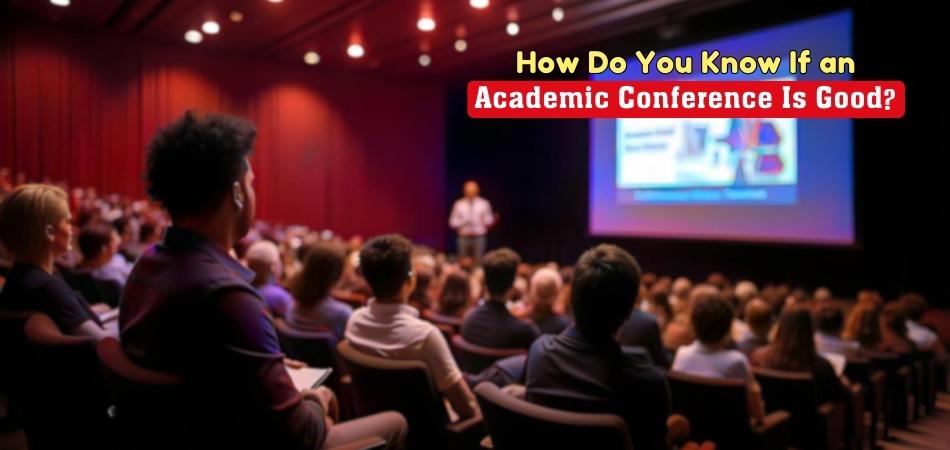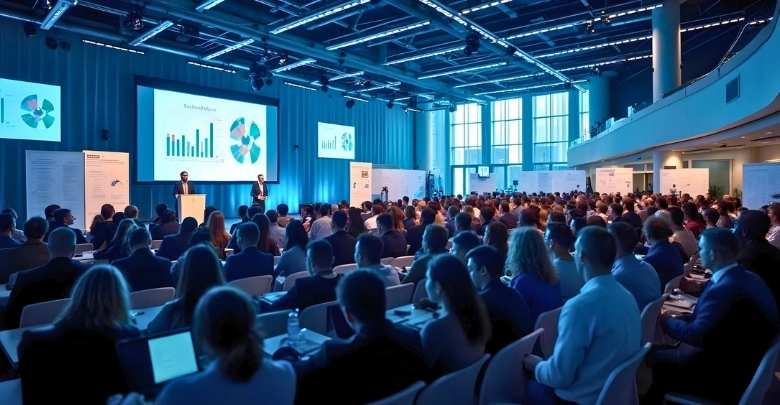Getting involved in academic conferences can be a great way to expand your knowledge, connect with professionals, and stay updated on the latest research in your field. However, with so many events to choose from, you have to ensure that you select one worth your time. So, how do you know if an academic conference is good?
To determine if an academic conference is good, you should look at its relevance to your field, the quality of speakers, networking opportunities, and feedback from past attendees. The reputation of the organizing body, along with a well-structured program and clear objectives, are also essential indicators.
Here you will find information on how to assess and select the best conferences which will enable you to advance your academic and professional career. So stay tuned.
How Do You Know If an Academic Conference Is Good? – Key Indicators to Look For
It is possible to gain knowledge, skills, and professional connections by attending the right academic conference. But not all conferences deliver the value you expect. Being familiar with the key indicators of a quality conference helps you make informed decisions. Here’s how you can judge if an academic conference is truly worth attending.

Relevance to Your Field
The conference topics should align closely with your academic interests or professional goals. Check if the event features current research trends or innovations. Ensure the agenda addresses challenges and opportunities relevant to your field. A focused theme often signifies an impactful learning experience.
Speaker Quality
Renowned speakers bring credibility and expertise to any academic conference. Review the speakers’ backgrounds to ensure they are widely recognized in the field. Diverse perspectives from skilled speakers often lead to engaging discussions. High-quality presentations inspire participants and encourage thought-provoking questions.
Networking Opportunities
Effective conferences provide structured and casual networking chances for attendees. Look for meet-and-greet sessions, panel discussions, or networking lounges. Opportunities to meet like-minded professionals or potential collaborators are crucial. Meaningful connections often extend the value of the conference beyond the event.
Past Participant Feedback
Testimonials and reviews provide insights into the conference’s previous success. Look for feedback on organization, content quality, and participant satisfaction. Consistently positive reviews often signal a well-managed event. Avoid conferences with frequent complaints about logistics or speaker engagement.
Reputation of the Organizers
Reputable organizers ensure professionalism and high-quality planning in their events. Check the organizing body’s history with similar conferences. Consistent delivery of valuable events indicates reliability and expertise. Avoid conferences hosted by unknown or poorly reviewed organizations.
Structured Agenda and Clear Objectives
A detailed agenda reflects thorough planning and respect for attendees’ time. Objectives should be clear and aligned with the theme. Basically, upcoming international conferences typically provide detailed schedules that help attendees plan effectively. A disorganized or unclear schedule often signals poor organization.
Why Choosing the Right Academic Conference Matters?
Your professional growth can be significantly impacted by the choice of academic conferences. It’s not just about attending, but gaining valuable experiences as well. Here’s why picking the right one matters for your academic and career journey:
Expanding Your Knowledge Base
Academic conferences provide a platform to learn about the latest developments in your field. They offer insights from experts and innovators. Attending the right conference helps you stay updated on current research trends. This knowledge can enhance your academic and professional work.
Building Valuable Connections
Networking opportunities at conferences are invaluable for academic and career growth. Interacting with peers and experts can open new doors. Building relationships with like-minded professionals encourages collaboration and mentorship opportunities. These connections can lead to future partnerships and research opportunities.
Showcasing Your Research
Presenting at the right conference provides visibility to your work. It allows you to share your findings with a relevant audience. Constructive feedback from peers can improve your research quality. Recognition at a reputable conference can boost your academic profile.
Staying Motivated and Inspired
Engaging with pioneering ideas can reignite your passion for your work. Hearing success stories from others can fuel your motivation. Exposure to new concepts can spark innovative ideas for your research. Conferences can renew your enthusiasm for academic pursuits.
Enhancing Your Professional Reputation
Being associated with reputable conferences strengthens your credibility in your field. It reflects your dedication to staying informed and active. Your participation in recognized events showcases your commitment to academic excellence. This credibility can benefit your career in the long run.
Gaining Career Opportunities
Conferences often attract recruiters and industry leaders looking for talented individuals. They are a platform to showcase your expertise. Participating actively can help you stand out to potential employers. The right conference can lead to unexpected career advancements.
Do Academic Conferences Change Over Time?
Yes, academic conferences do change over time to meet evolving needs. Technological advancements have transformed how conferences are organized and attended. Virtual platforms now allow participants from around the world to engage without travel constraints.
As new research trends emerge, conferences adapt their focus. New disciplines and innovative topics are increasingly integrated into conference agendas. Formats also evolve, including interactive workshops and panel discussions, improving participant engagement.
Virtual and in-person formats are the future of academic conferences. Unlike traditional events, hybrid events have the goal of maximizing accessibility and interaction. With this evolution, it is ensuring that conferences remain relevant and valuable for academics and professionals in the near future.
The Changing Nature of Academic Conferences: How Can They Be Adopted?
Academic conferences are evolving to keep up with changing times. Adopting new trends and technologies ensures they remain relevant and impactful. Here’s how academic conferences can adapt to meet the needs of the future:
Utilizing Technology for Virtual Participation
Technology has enabled conferences to go beyond physical locations. Virtual platforms allow remote participants to join easily. Using live-streaming and recording tools, conferences can reach a global audience. This flexibility helps increase attendance and engagement.
Offering Hybrid Conference Formats
Hybrid conferences combine both in-person and virtual experiences. They offer the best of both worlds, making participation accessible. Attendees can choose their preferred format, ensuring wider involvement. This flexibility benefits both organizers and participants.
Focusing on Interactive and Engaging Sessions
Conferences should move away from passive lectures and offer interactive sessions. Workshops and discussions encourage deeper engagement. This shift helps attendees learn through active participation, not just passive listening. It enhances knowledge-sharing and collaboration among participants.
Prioritizing Inclusivity and Accessibility
Conferences should be accessible to people from diverse backgrounds. Offering translations and closed captions makes events more inclusive. Accessibility tools help people with disabilities engage in all activities. Ensuring everyone can participate will expand the reach of conferences.
Incorporating Real-Time Collaboration Tools
Collaboration is key to academic growth, and conferences must support real-time interactions. Tools like chat rooms and shared virtual spaces improve communication. These platforms allow participants to exchange ideas instantly. Real-time tools encourage networking and collaboration among attendees.
Adapting to Changing Academic Trends
The academic world constantly evolves with new disciplines and trends. Conferences must adapt to these changes by offering relevant topics. Organizers should assess current research and include emerging fields. This ensures conferences stay ahead of the curve and remain valuable.
Tips to Identify Red Flags of a Predatory or Low-Quality Academic Conference
You should not waste your time and money by attending an academic conference that won’t add to your knowledge and network. Beware of signs that indicate low credibility. The following red flags will help you avoid being conned into predatory conferences.
- Inconsistent or Unclear Topics: A legitimate academic conference sticks to focused themes. Overly broad or mismatched subjects often signal poor organization.
- Suspiciously Fast Paper Acceptance: Quick paper approval suggests insufficient peer review. Quality conferences have rigorous processes requiring time and attention.
- Lack of Credible Organizers: Search for organizers and affiliated institutions. Untraceable or obscure credentials often point to questionable practices.
- Absence of Quality Speakers: Renowned academic conferences highlight distinguished speakers. If headliners lack notable achievements, consider it a major warning.
- Overemphasis on Fees: Excessive promotion of registration costs rather than academic value is alarming. Fee-driven motives often indicate predatory intentions.
- No Indexed Publication Opportunities: Legitimate conferences usually ensure papers are published in reputable databases. Predatory ones may skip this entirely.
- Last-Minute Location Changes: Constantly shifting venues often indicate disorganization. Always confirm details, especially when you pack for a short academic conference or professional event abroad
- Generic Website Content: A poorly maintained website with unclear information raises suspicions. Authentic conferences provide transparent details about schedules and speakers.
FAQs About Deciding Whether an Academic Conference Is Good
Academic conferences require significant time and resources to attend. Below are frequently asked questions about assessing the quality of an academic conference and maximizing its benefits:
How Important Is Diversity in Conference Topics?
Diversity in topics allows for a broader learning experience. It ensures the inclusion of emerging fields and interdisciplinary discussions. Conferences with varied themes attract diverse participants and ideas. This variety encourages innovation and collaboration across academic disciplines.
Are Smaller Conferences as Valuable as Larger Ones?
Smaller conferences often provide more intimate networking opportunities. They allow participants to engage more directly with speakers and peers. Focused discussions can lead to meaningful collaborations. While larger conferences offer visibility, smaller ones often provide a more focused experience.
Can Post-Conference Activities Enhance Value?
Yes, post-conference activities like follow-up discussions or digital resources add value. They help attendees revisit and apply what they’ve learned. Recordings of sessions or access to shared materials improve long-term benefits. Such activities extend the impact of the conference.
Why Are Pre-Conference Workshops Beneficial?
Pre-conference workshops provide hands-on learning opportunities. They allow attendees to delve deeper into specific skills or topics. These workshops often offer more personal interaction with experts. This makes them valuable for building specialized knowledge before the main event.
What Are the Benefits of Attending Repeat Conferences?
Repeat conferences allow you to build on past connections. Familiarity with the event structure improves your planning and engagement. They often introduce updates or follow-ups to previous topics. Regular attendance strengthens professional networks and enriches ongoing learning.
Final Thoughts
The experience of attending an academic conference can be beneficial for both professional and personal growth. To determine “How do you know if an academic conference is good?”, consider its relevance to your field, the quality of speakers, networking opportunities, and feedback from past attendees. A well-structured agenda and the reputation of the organizers are also essential indicators of its value.
A conference that embraces inclusion, offers hybrid formats, and features interactive sessions provides even greater opportunities for learning and collaboration. By selecting the right conference and preparing thoughtfully, you can maximize its benefits and make meaningful connections. Remember, the key is to align your goals with the event’s offerings to ensure the event adds value to your academic and professional journey.







